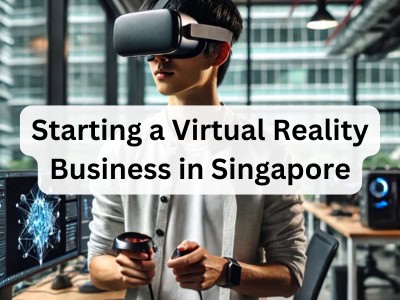This post is also available in:
简体中文 (Chinese (Simplified))
Beginner’s Guide on Starting a Virtual Reality Business in Singapore

Reasons to Start a Virtual Reality Business
The Virtual Reality industry offers immense potential due to its applications across various sectors such as gaming, education, healthcare, and real estate. The increasing demand for immersive experiences makes VR a lucrative business opportunity. Singapore’s strategic location, business-friendly policies, and advanced technological infrastructure further enhance its appeal as a hub for VR businesses.
What is the Virtual Reality Business About?
A Virtual Reality business involves creating immersive digital experiences that simulate real or imagined environments. This can range from developing VR content and software to providing VR hardware and accessories. The industry is characterized by rapid innovation, requiring businesses to stay updated with the latest technological advancements and consumer trends.
Why You Should Start a Virtual Reality Business in Singapore
Singapore’s cultural significance as a tech-savvy nation makes it an ideal location for a VR business. The government’s support for technological innovation, coupled with a diverse consumer base, provides a fertile ground for VR solutions. Moreover, Singapore’s connectivity with global markets allows for the expansion and scalability of VR ventures.
Detailed Steps to Establish Your Virtual Reality Business
1. Conduct Market Research
Understanding the market landscape is crucial. Identify your target audience, analyze competitors, and assess the demand for VR products and services. Consider consulting with business advisory services to gain deeper insights.
2. Develop a Business Plan
A well-crafted business plan outlines your business objectives, strategies, financial projections, and operational plans. It serves as a roadmap for your business journey. Learn more about creating a comprehensive business plan.
3. Register Your Business
Register your business with the Accounting and Corporate Regulatory Authority (ACRA) of Singapore. Choose a suitable business structure, such as a sole proprietorship, partnership, or private limited company. Explore Singapore incorporation services for professional assistance.
4. Obtain Necessary Licenses and Permits
Depending on your business activities, you may need specific licenses. For instance, if you’re developing VR software, ensure compliance with intellectual property laws. Consider nominee director services if required.
5. Set Up Operations
Establish your office or studio space, invest in the necessary VR equipment, and hire skilled professionals to develop and market your VR products. Utilize business registered address services for a professional setup.
6. Launch and Market Your Business
Develop a marketing strategy to promote your VR business. Utilize digital marketing channels, attend industry events, and collaborate with tech communities to build brand awareness.
Challenges and Considerations for Local and Foreign Entrepreneurs
Starting a VR business in Singapore comes with its set of challenges, such as high operational costs and fierce competition. Local entrepreneurs need to navigate regulatory requirements, while foreign entrepreneurs must understand the cultural nuances and legalities of doing business in Singapore. Explore foreign company setup options for more information.
Local Regulations and Licensing
Compliance with local regulations is crucial for the smooth operation of your VR business. Ensure adherence to data protection laws, especially if your business involves collecting user data. Additionally, be aware of licensing requirements related to software development and distribution. Consult professional accounting services for financial compliance.
Financial Planning Aspects
Effective financial planning is vital for sustaining your VR business. Consider initial investment costs, ongoing operational expenses, and revenue streams. Explore funding options such as government grants, venture capital, and angel investors to support your business growth. You might also consider using AI accounting software for efficient financial management.
Conclusion
Starting a Virtual Reality business in Singapore offers exciting opportunities for innovation and growth. By understanding the market, complying with regulations, and strategically planning your operations, you can establish a successful VR venture in this vibrant city-state.
Ready to Start Your Virtual Reality Business?
If you’re ready to embark on your VR business journey, now is the time to take action. With the right approach and resources, you can turn your vision into reality and make a significant impact in the industry. Contact us today to get started.
For those interested in integrating advanced technology solutions, consider exploring human resource management software to enhance your business operations.
Frequently Asked Questions
What are the key reasons to start a Virtual Reality business in Singapore?
Answer: Singapore’s strategic location, advanced technological infrastructure, supportive government policies, and a tech-savvy population make it an ideal place to start a Virtual Reality business.
What are the essential steps to establish a Virtual Reality business in Singapore?
Answer: Key steps include conducting market research, developing a business plan, registering your business with ACRA, obtaining necessary licenses, setting up operations, and launching your marketing strategy.
What licenses are required to start a Virtual Reality business in Singapore?
Answer: Depending on your business activities, you may need licenses related to software development, intellectual property compliance, and possibly data protection if handling user data.
What challenges might entrepreneurs face when starting a Virtual Reality business in Singapore?
Answer: Entrepreneurs may encounter challenges such as high operational costs, intense competition, and the need to stay updated with rapid technological advancements.
How important is financial planning when starting a Virtual Reality business in Singapore?
Answer: Financial planning is crucial to manage initial investments, operational expenses, and to explore funding options like government grants or venture capital.
How can 3E Accounting assist in starting a Virtual Reality business in Singapore?
Answer: 3E Accounting can assist with business registration, compliance with local regulations, financial planning, and providing strategic business advice tailored to the VR industry.
What are the employment requirements for foreign entrepreneurs starting a Virtual Reality business in Singapore?
Answer: Foreign entrepreneurs need to understand employment pass requirements, adhere to local labor laws, and consider utilizing nominee director services for compliance.
What role does innovation play in the success of a Virtual Reality business in Singapore?
Answer: Innovation is critical for staying competitive in the VR industry. Businesses must continuously develop cutting-edge solutions and adapt to emerging technologies to succeed.



